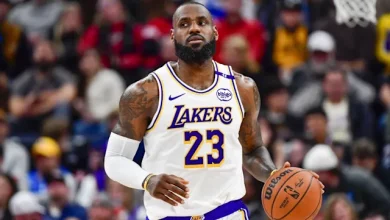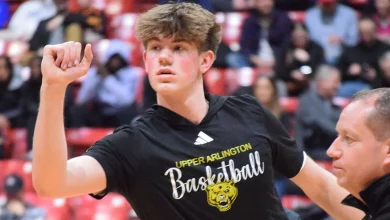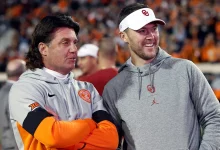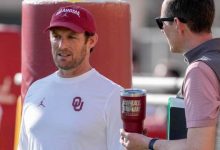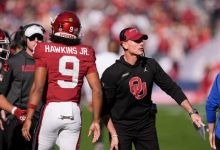State of A&M sports: Football coach Mike Elko, AD Trev Alberts ride highs, lows
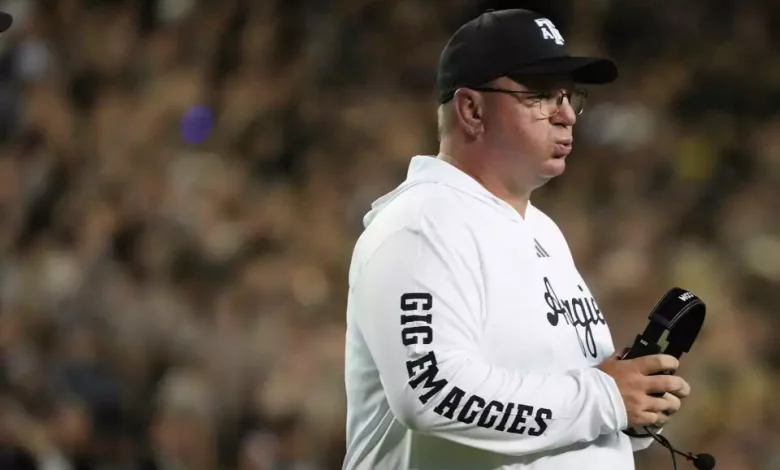
State of A&M sports: Football coach Mike Elko, AD Trev Alberts ride highs, lows
That would sound overly optimistic for the Aggies, who raced to a 7-1 record the first two months of the season with a competitive loss to eventual college football finalist Notre Dame, only to lose four of their last five and fall out of the rankings.
“Obviously we had some departures on the defensive line and lost some talent,” said Elko, who had served as Jimbo Fisher’s defensive coordinator for four seasons before going to Duke with two very successful seasons as head coach. “But when you talk about intricacies of the scheme, knowledge of what you’re trying to do, strength and conditioning development, overall program mentality from year one to year two, I think everything takes a step forward.”
At least in theory.
And A&M does return 16 starters, including quarterback Marcel Reed, the entire offensive line, two stud running backs and an intact secondary. The latter fact could be good or bad.
It might not have helped when Elko grandiosely forecast that A&M would develop into the premier football program in the country. That said, it’s been a minute since its last — and only — national title in 1939.
But the Aggies have rarely fulfilled their promise, much like 2024 when they stumbled badly down the stretch and lost their last two games to arch-rival Texas at Kyle Field and to USC in the Las Vegas Bowl.
In addition, A&M’s friendly 2024 home schedule flips with the team having to face a daunting road schedule that will take it to Notre Dame, LSU, Missouri and Texas.
So what went wrong last year?
“It was a lot of things,” Elko said. “We were in situations we were not in before, back-to-back night games on road as the team being hunted. I don’t think we handled that particularly well when you look at it, certainly not down at South Carolina. Auburn.
“I think we fought better and competed better. Then when you look at it, it comes down to a double-overtime game and us just trying to find a way to make another play.
It didn’t help that the vaunted defensive line that had three players drafted by NFL teams in the first 62 picks disappeared down the stretch and didn’t live up to its billing. Many of Elko’s fourth-down gambles, including against Texas, seriously backfired. A&M fell to a weak Auburn team in four overtimes.
The Aggies limped to the finish line.
That much was obvious.
Not that the football team hoarded all the late-season misery.
The men’s basketball team lost in the second round of the NCAA Tournament, then lost its head coach, Buzz Williams, to Maryland.
The baseball team began the year as the preseason No. 1, then fell to 11-19 in the SEC and failed to qualify for the NCAA Tournament.
The softball team completed the regular season as the No. 1 team in the land, then became the first team ranked that high to get eliminated in the regional it hosted by Liberty.
And now athletic director Trev Alberts has to wrestle with the decision to retain or fire first-year baseball head coach Michael Earley, a choice he told about 10 reporters he will put off until he returns to campus and has a dialogue with his beleaguered coach. Many expect Earley to lose his job.
“I’ve had a little bit of communication with Michael, but I’d love to get back to College Station, sit down and sort of recap,” said Alberts, who has been on the job fewer than 15 months. “Obviously we had some highs in baseball. Clearly we fell short. It was a frustrating season and disappointing on a lot of different levels.”
He added that there’s always an economic component to such decisions, complicated by the sticker-shock buyout of Jimbo Fisher for $76 million, “but I assure you, in this situation, those decisions are not being driven economically. We’ll do what we think is the best long-term interest of our baseball program and our athletic department.”
Equally prioritized in Alberts’ thinking is the pending revenue sharing ordered by the House settlement that is forthcoming in weeks, if not days.
He spends much of his time calculating A&M’s future and examining spreadsheets, ones that almost become obsolete by the time they’re printed out. All the uncertainty doesn’t help.
So much resolves around the CFP format that is ultimately agreed upon before other decisions can be made about a potential addition of a ninth SEC game.
“Are we going to four auto-bids? Are we not?” Alberts said. “We need some answers. Nine games makes sense for a lot of different reasons, but it doesn’t make sense for us if we’re not guaranteed to be protected.”
He didn’t say what the specific allocations from revenue-sharing will be for Aggie sports, but did say the school has chosen six sports to share that $20.5 million and will fully fund what it expects to be 410 scholarships and said football was the program’s lone revenue generator. That could come as a shock to some since most Division I programs make a profit off men’s basketball.
Alberts has informed those six head coaches of that decision, but didn’t say how much football would draw from that. Texas is on the record as saying 75% of that money will go to football.
“We need to through some data in the first year, see what others are doing competitively,” he said. “But I think we have a good strategy. In this new reality, we simply cannot afford to add additional debt service.”
Alberts said A&M isn’t interested in emphasizing only football and baseball, for instance.
“We don’t want to go down the path of just investing in two sports and basically downsizing the support of every other sport. It’s really not of interest to us. We want to have a broad-based athletic department, but we will never do anything that ultimately is harmful to the one sport that frankly drives the entire revenue engine of Texas A&M.”
Interestingly enough, even if Judge Claude Wilkens were to disapprove the House settlement, Alberts said the Aggies still plan to share revenue with their athletes.
“I think the general sentiment is we might just go forward and share revenue anyway,” he said. “We want to do this. We want to bring some common sense to what we’re doing. There’s a lot of angst, man. You guys can probably feel it.”
For Elko’s part, he like most other SEC head coaches, favor a move to one transfer portal window, that coming soon after the end of the playoffs, and would dearly love some clear resolution soon on revenue-sharing.
“I could not imagine a professional sports league going into their offseason, midway through their offseason, changing the salary cap rules,” Elko said. “When you are trying to build a program from where we were to where we want to be, or where we should be, you want it to go smooth and you want it to go easy. It does not always work like that, and that does not mean that things are not going in the right direction. It just means you have to make some adjustments and fix it moving forward.”
Sadly for the Aggies, there’s a lot to fix.
And it’s certainly worn on them.
“There are days when you win and days when you lose,” said Alberts, a former All-American and College Football Hall of Fame linebacker under Tom Osborne at Nebraska. “There are some weekends that I walk around the house and I tell my wife, ‘We’re really good at this, honey.’ And there are weekends when it feels like we just cannot win. You know, you fight every day, and we’ll win some, we’ll lose some.”



